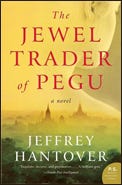A title like The Jewel Trader of Pegu leads readers to expect wonder and peril in an exotic locale. They'll find it, but above all else, this novel is a tender love story and a spiritual meditation on compassion.
Abraham is a widowed Venetian Jew in his late twenties. In the year 1598, his uncle sends him on a mission to buy jewels in the Burmese merchant town of Pegu. In Pegu, he sets aside the yellow hat labeling him Jew and inferior, and walks as freely through the streets as any other European, or indeed a native. He delights in the house assigned to him, "even though its walls are made of wood, its floor of split bamboo, and its roof cane and plaster mixed with lime," because it is utterly unlike a Venetian tenement "stacked family upon family, in a warren of quarters carved one from the other." The Peguans "bow their heads and with a slight smile say it is a very auspicious house."
Nevertheless, the local customs astound Abraham, who writes of the women, "Where to begin the litany of their grotesqueries? Their teeth are blackened dark as charcoal and their lips stained red from the betel leaves they constantly chew and spit upon the ground.... The debauched Europeans who take these women for their temporary wives must have eyes blinded by desire. There can be no affection in these arrangements." There is foreshadowing here. Abraham soon learns why the Peguans consider his house auspicious, when he is asked to perform a task not only forbidden by his religion but deeply repugnant to him.
The prose alternates among "historical" documents, Joseph's letters to his brother, and present-tense narration by a young Burmese woman whose path is destined to cross Abraham's, transforming his life. Small but infused with light, The Jewel Trader of Pegu is itself a jewel of a novel. (2008, 227 pages)




